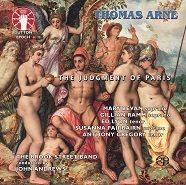Interview,
John Andrews on Arne's The Judgment of Paris
 Thomas Arne is perhaps the epitome of the one-hit wonder; most people in the Western world have heard of his rousing song 'Rule, Britannia', originally written to round off the patriotic allegorical work The Masque of Alfred, but few if any could name a second work by this composer, who in his day was one of the most successful musicians in London.
Thomas Arne is perhaps the epitome of the one-hit wonder; most people in the Western world have heard of his rousing song 'Rule, Britannia', originally written to round off the patriotic allegorical work The Masque of Alfred, but few if any could name a second work by this composer, who in his day was one of the most successful musicians in London.
Doing their bit to restore Arne's music to its rightful place in the repertoire are John Andrews and the Brook Street Band, together with soloists Mary Bevan, Susanna Fairbairn, Gillian Ramm and Ed Lyon, who have recorded for the first time his opera The Judgment of Paris - an adaptation of the famous Greek myth of the beauty-contest between the goddesses Venus, Athene and Juno. I spoke to John about the way the tale found its way into the opera house, and how its undeniably racy subject matter might have been received by audiences at the time.
Whenever Arne’s music is performed, reference is made to his having existed in Handel’s shadow. Do you think his reputation still suffers from being seen as not quite in the first rank of Baroque composers?
Arne undoubtedly suffered in his own time from reaching artistic maturity at the height of Handel’s fame. Equally important was his Catholicism, which prevented him from holding any of the court or ecclesiastical posts that composers traditionally relied on for security and prestige. In his own time he was extremely successful in the theatre, and The Judgment of Paris made a sufficient stir to provoke Handel into setting Congreve’s other operatic text Semele the following season in response. In a way he suffered more in posterity from the decline in English-language opera, and then the continued successes of visiting composers such as JC Bach, and after him, Mendelssohn.
It didn’t help that many of his complete scores were destroyed in the Covent Garden fire in 1780, leaving us with very few of his works complete, as secco recitatives and choruses were rarely included in the published scores. His great opera Artaxerxes is missing all of its recitatives, and The Judgment of Paris is missing most of its recitatives and four of its choruses, and so it is only with very patient scholarly work that these have become available in performable editions. These have revealed Arne’s huge fertility of invention and his gifts for setting melodies in English. I encountered his works when studying for a PhD on Handel’s classical oratorios – over which they had a major influence - and was immediately entranced.
Plenty of stage works written in this period carried political subtexts – Arne’s own The Masque of Alfred, from which the ever-popular 'Rule, Britannia' is taken, being a notable example. Do you see any allegorical themes in The Judgment of Paris?
Arne’s other masques were hugely political, representing the Prince of Wales’ party in opposition to George II. However, The Judgment of Paris stands apart from the rest of his output as it uses a libretto written forty years earlier by William Congreve for the great ‘Musick Prize’ of 1701. This was a composition between London’s leading composers, so the allegory is the nature of competition itself and the competing talents of the artists involved. Arne chose to use it at a time when he was seriously rivalling Handel, so it’s hard not to imagine that the idea of two composers going head to head, much as the three goddesses do, appealed to him. The original 1701 competition was also instituted specifically to showcase British talent in the face of Italian-imported opera. So there is also a suggestion that by choosing this text by a great English author, Arne is making a point about trying to overturn the dominance of the German-born Handel.
Do you think the removal from the cast of the goddess Eris, who in most versions of the myth presented the golden apple with the explicit goal of sowing discord (ultimately setting the Trojan War in motion), is significant?
The removal of Eris is quite deliberate, as it separates the story entirely from the context of the Trojan War. This makes the competition innocent of dark forces, and therefore makes the ending unambiguously triumphant. Restoration theatre demanded a neat and ideally happy resolution to events (this is the era in which King Lear was given a happy ending) and so the introduction of darker elements would have been felt out of keeping with the playful nature of the drama.
The three goddesses’s tactics in pursuit of Paris’ approval are quite different, matching their personalities. Can you tell us a little about how Arne reflects this in the music he gives to each of them?
I think that Arne is quite deliberately teasing Handel and his followers with the music that he writes for the three goddesses. Juno seems cut from the mould of Handelian operatic heroines with a strophic aria that demands really virtuosic embellishments. Pallas (Athena) seems to have stepped directly out of the Handel’s Coronation Anthems or perhaps the Utrecht Te Deum, with the sort of unashamed D major pomp, replete with trumpets and drums, that had won Handel widespread affection after 1727. I think that it is no accident that Venus wins the day with a series of arias disarming in their simplicity, but also deliberately redolent of Purcell and that last generation of English composers. Her lack of operatic affectation or ceremonial bombast is key to her seduction.
This episode in Greek mythology has unsurprisingly been a popular inspiration for painters, with one encyclopedia archly commenting that “The opportunity for three female nudes was a large part of the attraction of the subject.” Would the same have been true of a staged treatment of the subject?
Neither Congreve’s original setting in 1701, nor Arne’s treatment in 1742 would have been fully staged, but rather presented in concert performance with elaborate sets and some form of costume. But this was a gift to the librettist and composers who could therefore conjure up a vision of nudity and erotic desire in the music, something that they would never have been allowed to do if they were actually staging it (again, something Handel would adopt the following year in Semele). Paris exclaims that “Since a gay robe an Ill-shape may disguise/When each is undressed I’ll judge of the best/For ‘tis not a face that will carry the prize.” Within the decorum of a concert, there was clearly a great appeal in allowing the audience’s imaginations to fill in the picture. In 1701 in the context of lots of bawdy Restoration comedies this was not particularly daring. By 1742 under the more austere Hanoverians, it most certainly was!
Mary Bevan (Venus), Susanna Fairbairn (Pallas), Gillian Ramm (Juno), Ed Lyon (Paris), Anthony Gregory (Mercury), Andrew Mahon (bass)
The Brook Street Band, John Andrews
Available Format: SACD



